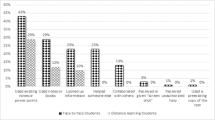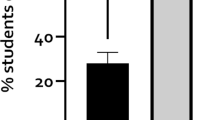Abstract
College and university faculty and administrators are responsible for constructing academic honesty policies and communicating them to students. This is often attempted through institutional honesty policies and university-wide honor codes. While these approaches have been widely researched, less attention has been given to the role of individual faculty members. That role is examined in this study by addressing student reactions to professors based on their academic honesty policies. In addition to demographic information, data were gathered about student attitudes and beliefs concerning academic dishonesty and their decision to enroll in or avoid a course being taught by a professor with zero tolerance for academic dishonesty. The findings regarding different instructors’ approaches toward academic dishonesty indicate that an intolerant policy will keep dishonest students away, but at a price—it will also detract many honest students.

Similar content being viewed by others
References
Ashworth P., Bannister P., Thorne P. (1997). Guilty in whose eyes? University students’ perceptions of cheating and plagiarism in academic work and assessment. Studies in Higher Education 22(2):187–203
Bowers W. J. (1964). Student Dishonesty and its Control in College. New York, Bureau of Applied Social Research, Columbia University
Brooks C. M., Cunnigham R., Hinson N., Brown S., Weaver B. (1981). Student attitudes toward a medical school honor code. Journal of Medical Education 56(8):669–671
Callahan D. (2004). The Cheating Culture: Why More Americans Are Doing Wrong to Get Ahead. Orlando, FL, Harcourt, Inc.
Canning R. (1956). Does an honor system reduce classroom cheating? An experimental answer. Journal of Experimental Education 24:291–296
Caruana A., Ramaseshan B., Ewing M. T. (2000). The effect of anomie on academic dishonesty among university students. The International Journal of Educational Management 14(1):23–29
Clement M. J. (2001). Academic dishonesty: To be or not to be?. Journal of Criminal Justice Education 12(2):253–270
Engle T. J., Smith J. L. (1990). The ethical standards of accounting academics. Issues in Accounting Education 5(1):7–29
Fishbein L. (1993). We can curb college cheating. The Chronicle of Higher Education 40(15):A52
Franklin-Stokes A., Newstead S. E. (1995). Undergraduate cheating: Who does what and why?. Studies in Higher Education 20(2):159–172
Gomez D. S. (2001). Putting the shame back in student cheating. The Virginia Journal of Education 94:6–10
Harding T. S., Carpenter D. D., Finelli C. J., Passow H. J. (2004). Does academic dishonesty relate to unethical behavior in professional practice?. An exploratory study. Science and Engineering Ethics 10(2):311–324
Harris J. R. (1989). Ethical values and decision processes of male and female business students. Journal of Education for Business 64(5):234–238
Kidwell L. A., Wozniak K., Laurel J. P. (2003). Student reports and faculty perceptions of academic dishonesty. Teaching Business Ethics 7(3):205–214
Mahon R. L. (2002). Got plagiarism? Try the guillotine. Community College Week 15(9):4–5
McCabe D. L. (1997). Classroom cheating among natural science and engineering majors. Science and Engineering Ethics 3(4):433–445
McCabe D. L., Pavela G. (2000). Some good news about academic integrity. Change 32(5):32–38
McCabe D. L., Trevino L. K. (1993). Academic dishonesty: Honor codes and other contextual influences. Journal of Higher Education 64(5):522–538
McCabe D. L., Trevino L. K. (1997). Individual and contextual influences on academic dishonesty: A multi-campus investigation. Research in Higher Education 38(3):379–396
McCabe D. L., Trevino L. K. (2002). Honesty and honor codes. Academe 88(1):37–41
McCabe D. L., Trevino L. K., Butterfield K. D. (2001). Cheating in academic institutions: A decade of research. Ethics & Behavior 11(3):219-232
McCabe D. L., Trevino L. K., Butterfield K. D. (2001). Dishonesty in academic environments. Journal of Higher Education 72(1):29–45
Milem J. F., Berger J. B., Dey E. L. (2000). Faculty time allocation: A study of change over twenty years. Journal of Higher Education 71(4):454–475
Nuss E. M. (1984). Academic integrity: Comparing faculty and student attitudes. Improving College and University Teaching 32(3):140–144
Pincus H. S., Schmelkin L. P. (2003). Faculty perceptions of academic dishonesty: A multidimensional scaling analysis. Journal of Higher Education 74(2):196–209
Porter S., Whitcomb W. (2003). The impact of lottery incentives on student survey response rates. Research in Higher Education 44(4):389–407
Rezaee Z., Elmore R. C., Szendi J. Z. (2001). Ethical behavior in higher educational institutions: The role of the code of conduct. Journal of Business Ethics 30(2):171–183
Sims R. L. (1993). The relationship between academic dishonesty and unethical business practices. Journal of Education for Business 68(4):207–211
Sims R. L. (1995). The severity of academic dishonesty: A comparison of faculty and student views. Psychology in the Schools 32(3):233–238
Smyth M. L., Davis J. R. (2004). Perceptions of dishonesty among two-year college students: Academic versus business situations. Journal of Business Ethics 51(1): 63–73
Stern E. B., Havlicek L. (1986). Academic misconduct: Results of faculty and undergraduate student surveys. Journal of Allied Health 15(2):129–142
Taylor K. R. (2003). Cheater, cheater. Principal Leadership 3(8):74–77
Whitley B. E. (1998). Factors associated with cheating among college students: A review. Research in Higher Education 39(3):235–274
Whitley B. E., Kost C. R. (1999). College students’ perceptions of peers who cheat. Journal of Applied Social Psychology 29(8):1732–1760
Wood J. A., Longenecker J. G., McKinney J. A., Moore C. W. (1988). Ethical attitudes of students and business professionals: A study of moral reasoning. Journal of Business Ethics 7(4):249–257
Acknowledgments
The research was supported by a Department of Accountancy Summer Research Grant. The authors thank the student survey respondents and Maria Skaletsky, who assisted with data analysis. The authors also thank David Schwarzkopf for his insights in designing the survey instrument.
Author information
Authors and Affiliations
Corresponding author
Appendices
Appendix A: Survey Instrument Questions Regarding Professor’s Policy
Other Professor
Assume a professor is known for making the following statement the first day of class: I take the College’s policy on academic honesty seriously in this class. That policy is available in the Student Handbook and on the College’s website. I urge you to read it and to come to me if you have any questions about it. If you have any doubts about whether what you are doing in class or on an assignment may be seen as a violation of this policy, please see me before you take any action that may get you in trouble. I think you should be aware that in the past I have filed reports of academic dishonesty for students in my classes, with penalties ranging from getting a zero on an assignment to getting an F in the course.
Zero Tolerance Professor
Assume a professor is known for making the following statement the first day of class: In order to protect honest students, I will not tolerate any academic dishonesty in this class. Anybody caught cheating will receive an F in the course. Cheating includes the following: using illicit aids during an exam; copying from another student’s exam, term paper, course project, or homework; allowing another student to copy from your exam, term paper, course project, or homework; submitting someone else’s term paper or course project as your own; allowing someone to use your term paper or course project; copying something from the internet and not indicating the source; receiving or giving help on a graded assignment or project (other than group work) that goes beyond what the instructor allows; stealing examination material.
Responses: Go out of your way to register for this professor’s class; Try to register for this professor’s class; Be indifferent in selecting this professor’s class; Try to avoid this professor’s class; Avoid this professor’s class at all costs.
Appendix B
Respondents were classified from most honest (category 1) to most dishonest (category 5) as follows:
Dishonesty Category | Average Score on the 8 Most Serious Acts (Range: 1–5) | Percentage of Respondents (%) |
|---|---|---|
1 | 1 | 57 |
2 | 1.125 | 15 |
3 | 1.14–1.25 | 8 |
4 | 1.28–1.57 | 10 |
5 | 1.625 and above | 9 |
Rights and permissions
About this article
Cite this article
Levy, E., Rakovski, C. ACADEMIC DISHONESTY: A Zero Tolerance Professor and Student Registration Choices. Res High Educ 47, 735–754 (2006). https://doi.org/10.1007/s11162-006-9013-8
Received:
Published:
Issue Date:
DOI: https://doi.org/10.1007/s11162-006-9013-8




